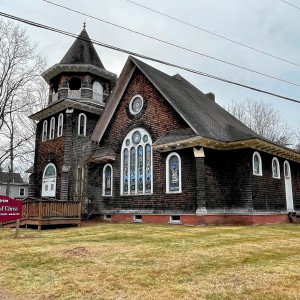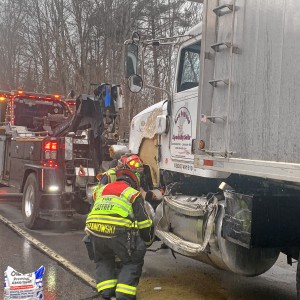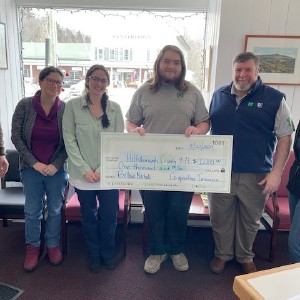BUSINESS QUARTERLY: Local farms are branching out
| Published: 04-28-2022 10:35 AM |
Making money by farming can be tough these days, and according to some local farmers, the best way to get around it is to branch out.
“To be able to make it as a small farm, you need to have some other kind of income,” said Christie Reed, who owns The Root Cafe in Temple.
Reed and her husband purchased their farm in Temple after a cafe in Wilton that Reed helped start, Hilltop Cafe, closed in 2018. Hilltop Cafe was farm-sustained, and Reed said that she wanted to keep up that kind of work.
“I wanted to continue being involved with food. I love cooking and just creating space for people to gather together around food,” she said.
And when she was working on starting the farm, a key element of her decision-making was having the cafe as a way to supplement the farm’s income.
“Because it’s a short season, definitely you’re counting on farm goods to be your livelihood, you have to have some way of turning them into something that you can spread throughout the year,” Reed said.
As part of that effort, Reed said that they try to grow items that can be stored or used easily in food for the cafe, including greens, carrots and beets, squash, tomatoes, peppers and onions and specialty items like artichokes and Brussels sprouts.
“That’s where the cafe kitchen comes in,” said Reed. “We can serve ready-made meals to people, so there’s the little cafe aspect of it, and the kitchen is set up for processing so we can make our own harvest.”
Article continues after...
Yesterday's Most Read Articles
 Petitioners seek special Town Meeting regarding tax lien on Antrim Church of Christ
Petitioners seek special Town Meeting regarding tax lien on Antrim Church of Christ
 New photography studio opens on Jaffrey Main Street
New photography studio opens on Jaffrey Main Street
 State of the Schools – Budget challenges, but lots to celebrate at Mascenic
State of the Schools – Budget challenges, but lots to celebrate at Mascenic
 UPDATE: Drivers identified in Jaffrey dump truck crash
UPDATE: Drivers identified in Jaffrey dump truck crash
 Frank Edelblut speaks at Dublin Education Advisory Committee forum
Frank Edelblut speaks at Dublin Education Advisory Committee forum
Like the cafe, other local farms were started with the intention of having supplementary business practices involved from the beginning. Wolf Pine Hollow, a new farm in Hancock, is getting ready to open and offer agritourism as part of its business model.
“When we set up to build our farm and business model, agritourism is a large part of the economic sustainability of the farm,” said Ariane Ice, who co-owns the farm with her husband, Tom.
They began acquiring the land for the farm at the end of 2020, Ice said, and have been working to put together the parcels into a property that is now over 100 acres. Part of the property used to belong to a farm back in the 1800s.
Ice said the land will be used for a variety of farm activities, with many types of fruit being grown, in addition to other crops and even flowers, along with many farm animals being kept on the property. Built into the business will be opportunities for visitors to participate in farm activities, according to Ice.
“We have designed our land, the infrastructure of the land, to accommodate as many experiences as we could think of,” said Ice. “We have designed to be a four-season experience with agriculture at the hub of it.”
Experiences will include pick-your-own crops, tending to the farm animals and exploring the land. Ice said they have made trails on the land, and there is wildlife to see like a large beaver pond. Plus, Ice said, there will be a farmstand opening soon to highlight what Wolf Pine is growing and producing.
“We’re setting it up so people can come in and enjoy the farm and enjoy food,” she said.
The hope is to cater the experience to people looking for what Ice calls “farm-luxe” -- the experience of getting out onto a farm for those who have never done it before. There will be places to stay on the property, and activities offered like painting and goat yoga. They also hope to host festivals related to the crops they’re growing.
“It’s hard work,” said Ice. “That’s one thing that modern farmers and traditional farmers would agree on. A lot of traditional farmers probably don’t think about agritourism. I think agritourism is a necessary element for a farm to be economically viable.”
For other local farms, starting from scratch with such considerations built in isn’t an option. For Curtis Farm in Wilton, it was a transition in the way they did business.
“We shut down in the early ’90s from a traditional diversified farm with cattle and fruit, hay and all that stuff, and we went all hay,” said Matt Fish.
After that, in the late 1990s, they pivoted and began to market the farm as a wedding venue. According to Fish, this was a decision made out of “pure necessity.”
“The cost and maintenance of these huge buildings and farm property is just really expensive, so it was kind of do or die,” he said.
Now, Curtis Farm hosts between 15 and 18 weddings a year, he said. They also host other events, such as the town’s Old Home Day, community fundraisers and political events, but weddings are where they generate most of that extra money.
“For us, at least, if there are no weddings, there is no farm,” Fish said. “It literally supports this place and a good portion of what we earn goes into maintaining this place. It’s a great symbiotic relationship, and it preserves our farm.”
It’s not just their farm, either, Fish added. Having a thriving wedding business leads to wider community effects that he said are positive.
“The overall trend is that agritourism-type of activities are helpful, and it helps get people here,” he said. “Our wedding business supports many other farms, because we source a lot of stuff as locally as possible. It’s kind of a web, so it’s mutually beneficial all the way around.”
Reed said that similarly, The Root Cafe strives to support other local farmers as much as possible -- they have local farms bring excess product to them for the cafe to use.
“We’re trying to help support everyone around and move it through this business so they can get a return on what they’ve put their hard work and effort into,” she said. “I think it’s been really helpful for these small farmers.”
Looking forward, Reed said she was also hoping to include paths for visitors to tour the gardens and hopefully create another draw that way.
“People can come and take a look at how we’re doing everything,” she said. “And hopefully they get inspired to grow some of their own vegetables.”

 State Rep. Jonah Wheeler of Peterborough seeks passage of bill that would increase state funding for schools
State Rep. Jonah Wheeler of Peterborough seeks passage of bill that would increase state funding for schools Bellows-Nichols makes donation to Hillsborough County 4-H
Bellows-Nichols makes donation to Hillsborough County 4-H
